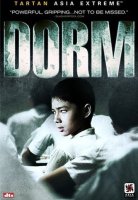BUY IT AT AMAZON: CLICK HERE!
STUDIO: Tartan Video
MSRP: $22.95
RATED: NR
RUNNING TIME: 107 Minutes
SPECIAL FEATURES:
• Feature Commentary w/ director & film critics
• "Making-of" featurette
• "Behind the Scenes" featurette
• Special Effecets featurette
• Deleted scenes w/ commentary
• Character introductions
• Trailers
The
Pitch
"It’s
The Devil’s Backbone meets The Sixth Sense!"
The
Humans
Charlie
Trairat, Sirachuch Chienthaworn, Chintara Sukapatana.
The
Nutshell
Young
Chatree (Trairat) has been sent away to boarding school by his
emotionally distant father. Abandoned and insular, Chatree can’t
quite manage to insert himself into any of the social circles the
other boys at the school have long-since established. But just as
he’s about to withdraw completely from the world, Chatree meets
Vichien (Chienthaworn.) Together, they share fun and idle
disobedience of the school’s rules. But when they start to share
secrets, Chatree finds out that his troubled family life could never
compare to what Vichien has been through.
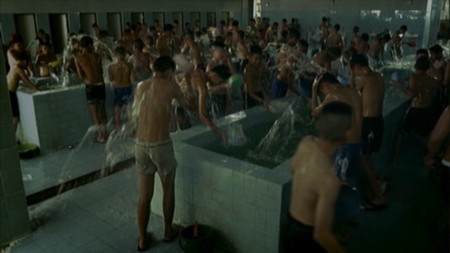
"It’s like Bugsy Malone meets Caligula!"
The
Lowdown
The
best zombie stories aren’t about the zombies. The best science
fiction stories aren’t about the science. And the best ghost stories
aren’t about ghosts. Dorm
isn’t about being haunted, just like Solaris
isn’t about planetary surveys. It’s not hard to compare it to The
Devil’s Backbone,
my very favorite ghost story, because both involve children, wrongful
deaths, and a kind of coming-of-age. Where Dorm
distinguishes itself is in the characterization of the ghost, and in
its moral of hope.
Kids
often get terrorized by ghosts in the movies; my pet theory is that’s
because preying on the innocence and ignorance of children creates a
more insistent fear. When children are asked to have more of a role
than terror-surrogate, though, the audience has to hope that the
filmmakers found child actors equal to the task. Fortunately, the
actors who play the two protagonists, Chatree and Vichien, do
adequate work. Trairat, in particular, as Chatree. He was directed
well, considering that his character is practically silent through
the entire first act. Trairat’s reactions and body language settle
him firmly in the audience’s perception. Right from the get-go, he’s
not a cipher; he’s a known quantity.
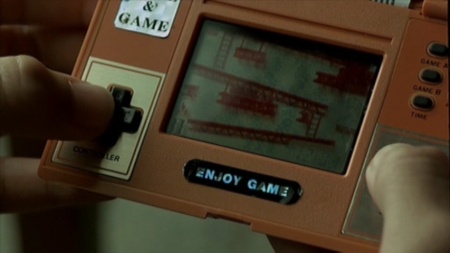
Instant geek credibility.
Chienthaworn
as Vichien has less to do — fulfilling his role of reluctant Virgil
with a bad case of depression — but carries himself as passably
enigmatic. He shines darkly whenever he gets the opportunity the
exploit the bitterness of the dead, and counters Chatree’s
progression neatly by ending up nearly silent.
For
all their necessary intensity, both boys are at their absolute best
when following the movie’s main thread: childhood friendship. Chatree
and Vichien become friends by dint of both being outcasts, for their
respective reasons. These are children in extraordinary
circumstances, but their relationship is refreshingly ordinary. The
script handles this element with restraint, never bothering to
exposit on the nature of their friendship. Instead, it supplies
scenarios wherein the audience gets a convincing portrayal of the
fickle turns and hints of half-realized love between the boys,
relying on your own encounters with the universal vocabulary of
childhood to provide the depth.
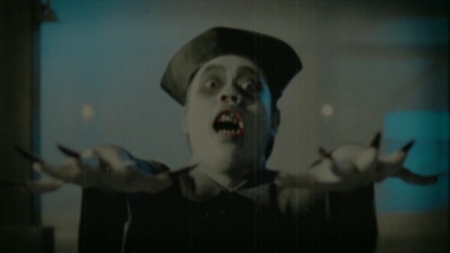
Don’t worry. It’s an Asian horror film, so if the monster’s not underage, then you’re safe.
If
you take that thread and follow it through the whole movie, you’ll
find it describes a solid, if unambitious, arc. To make a more
rewarding experience, two subplots are included. The first concerns
the guilt of the boarding school’s mistress, who blames herself for
the death of the boy ghost. The second concerns the guilt of
Chatree’s father, whose overreaction to an emotional situation
directly led to Chatree’s being shipped off to the school. Both of
these subplots inform the main with their considerations of what it
costs to earn forgiveness. No consensus is reached, neatly avoiding
the triteness inherent in any discussion of the virtues.
The
main arc, however, comes to a satisfying, tame conclusion. Chatree
provides the impetus for characters to grant themselves forgiveness,
and rises able to the challenge of doling out his own. Dorm
ends up being a familiar philosophy of spirits, who are bound by
weighty emotions to the Earth. The film has no aspirations higher
than its study of children coming up against obstacles in the paths
of their moral development; but it does so well, with subtlety,
skill, and a measure of grace.
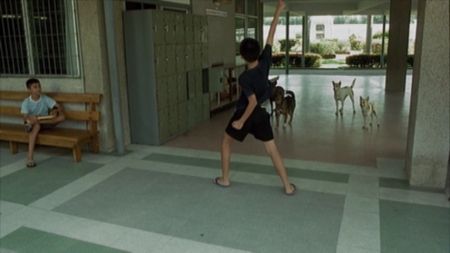
…but the lousy German Shepherd refused to give anything higher than a 7.
The
Package
Nothing
particularly exciting in the variety of bonus materials, except that
they are unusually full of content this time around. The feature
commentary is ruled by director Songyos Sugmakanan, accompanied by a
pair of (Thai?) film critics. The commentary covers a lot of the
technical aspects, including some strange alchemy regarding the
science of film development and video production, but also includes
more film-relevent material, such as Songyos’ apparently famous
temper with regards to directing children.
You
get a passel of deleted and extended scenes with optional director
commentary. Twenty minutes worth of scenes, actually, and nothing in
the five second snippet range. Most of these scenes could have worked
well in the final cut, and are primarily bent to building Chatree’s
character and environment.
There’s
a decent "making-of" featurette, and more informal
behind-the-scenes material, as well as a effects featurette centered
around the interesting water (and lack-of-water) effects of the third
act.
The
disc wraps up with a marketing-oriented set of introductions to the
film’s primary characters.
7.5
out of 10

